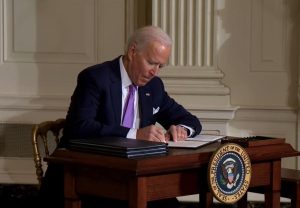Biden’s first week in office and what it means for free speech
[vc_row][vc_column][vc_column_text]

Biden signs EO/White House/WikiCommons
President Joe Biden has signed a number of executive orders in the early days of his presidency that will impact upon free speech.
How the 46th president of the United States of America will be remembered in terms of protecting free speech will become apparent in the coming years. But, after four years of President Trump’s attacks on the media and introducing legislation that restricted a range of freedoms, the early days of the Biden’s administration have come as a welcome relief.
Of the more than two dozen orders signed, at least six will have ramifications for Americans in terms of their freedom of expression.
Index takes a look at how each will do just that.
Preventing and combating discrimination on the basis of gender identity or sexual orientation
Perhaps the most notable executive order signed in the last week is the order to prevent discrimination on the basis of sexual orientation or gender identity. Discriminatory bans on LGBT+ people can often stop them from speaking out.
The order says: “Children should be able to learn without worrying about whether they will be denied access to the restroom, the locker room, or school sports. Adults should be able to earn a living and pursue a vocation knowing that they will not be fired, demoted, or mistreated because of whom they go home to or because how they dress does not conform to sex-based stereotypes.”
The order will end the ban on transgender students competing in sports teams for their identified gender.
Commenting on the order, the American Civil Liberties Union (ACLU) said: “The ACLU urges the Biden administration to not only roll back Trump administration policies discriminating against transgender and non-binary people, but take action to more fully recognize transgender and non-binary people. The ACLU’s priority for the Biden administration is an executive order related to accurate ID documents.”
Rescinds the Trump administration’s 1776 Commission, directs agencies to review their actions to ensure racial equity
Trump planned so-called ‘patriotic education’ in America’s schools, which raised alarm over First Amendment issues concerning forcing schools to teach children in a certain way.
The 1776 commission, set up in September 2020 and signed by executive order in November, essentially explored which parts of American should be taught and how they should be interpreted.
Announcing the commission Trump said: “We must clear away the twisted web of lies in our schools and classrooms and teach our children the magnificent truth about our country. We want our sons and daughters to know that they are citizens of the most exceptional nation in the history of the world.”
Biden rescinded the commission – which was ridiculed by historians – on his first day in office in an executive order on advancing racial equity.
Inclusion of non-citizens in the Census and apportionment of congressional representatives
When President Trump signed an executive order to not include people in censuses based on their immigration status, some viewed this as an infringement of their 14th amendment rights.
This section of the American constitution grants citizenship to all “born or naturalised within the United States” and gives them “equal protection under the laws”.
To not recognise illegal immigrants via a census may imply such people are no longer afforded such protections, key to ensuring their right to liberty and free speech. Biden’s order reverses this.
Fortifies DACA after Trump’s efforts to undo protections for undocumented people brought into the country as children
A new order reinstates the policy known as DACA or the Deferred Action for Childhood Arrivals, which had been implemented during the Obama presidency.
DACA ensures those undocumented immigrants who arrived in the USA under the age of 16 could apply for a permit allowing them to work legally in the country, providing they have a high school diploma and (next to) no criminal record.
Trump rescinded the policy and subsequently his Department of Justice claimed information given by those applying for the permits could later be used against them to deport them, despite the act of declaring information on the form being part of a process of establishing their legal entitlements. This was a clear violation of the protection of their free speech.
Reverses the Trump administration’s restrictions on US entry for passport holders from seven Muslim-majority countries
The First Amendment protects the sharing of information and speech. Trump’s ban on citizens of seven predominantly Muslim countries was an obvious barrier to this.
The policy also raised questions over the respect of religious freedom and reached the Supreme Court in 2018, where it was upheld.
Dissenting voices at the time were expressed by Justice Sonia Sotomayer who – joined by Ruth Bader Ginsburg – said: “The United States of America is a Nation built upon the promise of religious liberty. Our founders honoured that core promise by embedding the principle of religious neutrality in the First Amendment. The Court’s decision today fails to safeguard that fundamental principle.”
When Biden reversed the policy on 20 January, the White House released a statement saying: “The United States was built on a foundation of religious freedom and tolerance, a principle enshrined in the United States Constitution.”
Biden overturns ban on transgender troops
One of the most controversial policies brought in under the administration of President Donald Trump was the ban on transgender members of the military.
Transitioning troops were previously required to be stable in their gender for a minimum of 18 months before being allowed to serve. Biden’s latest executive order eliminates this.[/vc_column_text][/vc_column][/vc_row][vc_row][vc_column][three_column_post title=”You may also like to read” category_id=”5641″][/vc_column][/vc_row]
